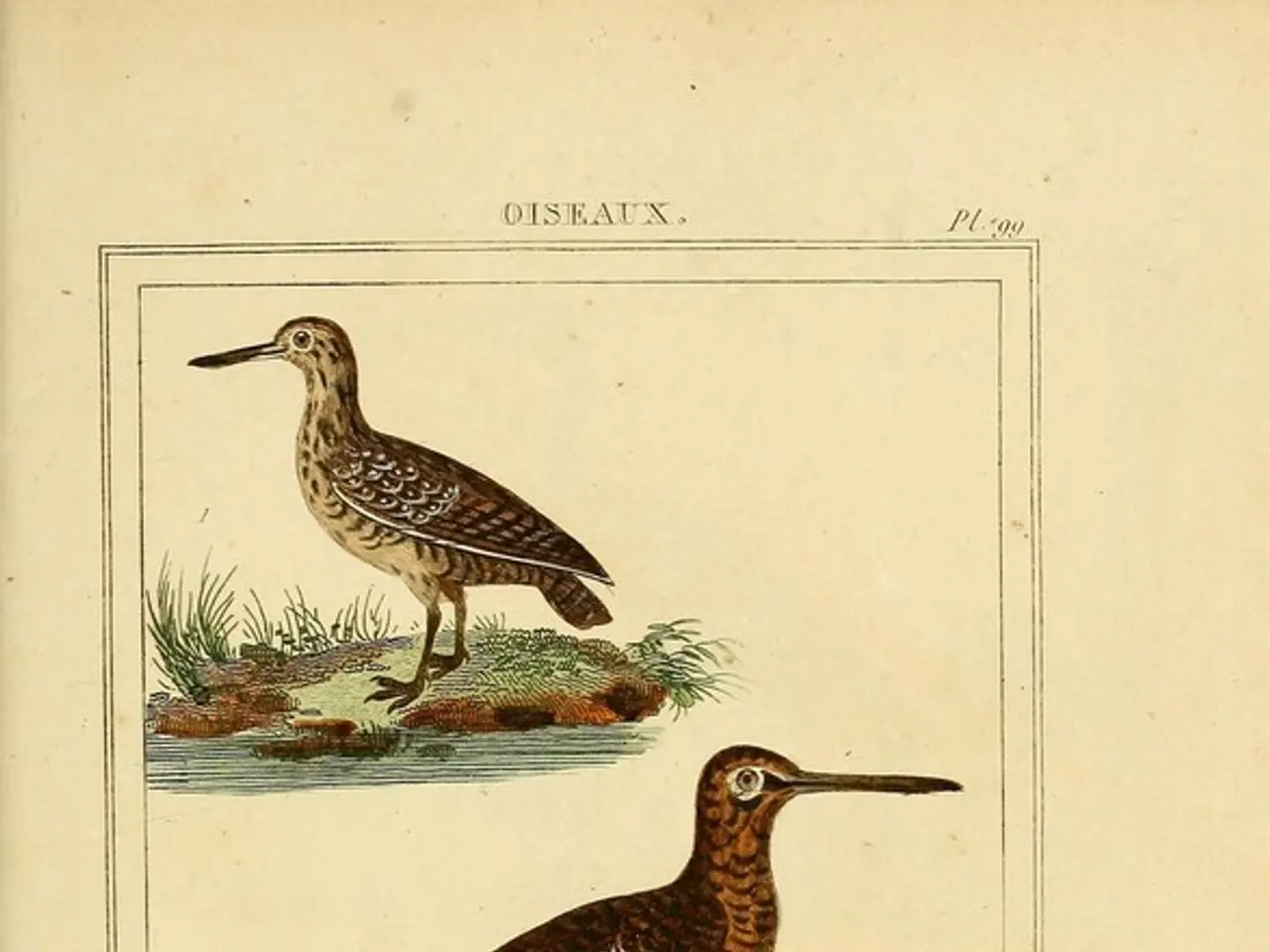Strategies for Attracting Birds to Your Yard with Suitable Food Options
In the heart of your garden, a vibrant symphony of feathers unfolds. From holly and honeysuckle to apples and pears, the abundance of fruit trees and shrubs attract a variety of birds, creating a haven for these winged wonders.
During the breeding season, soaking raisins overnight becomes especially important. This simple act softens them and adds additional moisture, providing a boost of energy for our avian friends. However, it's essential to remember that raisins, while loved by robins and thrushes, are toxic to dogs and cats.
Feeding wild birds can be a delightful pastime, but it's crucial to consider the potential drawbacks. Leaving bird food on the ground overnight can attract unwanted visitors such as rats or pests. To avoid this, only leave out a small amount of food, sweep up leftovers, and empty water from bird baths daily. Strategically placing bird feeders away from branches, fences, or poles that squirrels and rats can use to climb can also make feeding stations inaccessible to these unwanted visitors. Using a 'pest-proof' bird feeder can further help prevent pests.
When it comes to the best foods to offer wild birds, variety is key. Sunflower seeds, especially black oil sunflower, are a favourite among many species, including cardinals and blue jays. Nyjer seed, a must-have for finches, is another excellent choice. Unsalted peanuts, suet or fat balls, mealworms, and fresh fruits like apples, pears, berries, and oranges are also popular picks.
To reduce spillage and attract fewer unwanted animals, consider using feeders appropriate for each type of seed. For instance, tube feeders work well for nyjer seed. Feeders with smaller seed ports also create less spillage. Seed mix with already husked seeds leaves less mess, making clean-up a breeze.
Homemade fatballs can be a cost-effective, nutritious option. By mixing lard, peanut butter, and bird-friendly ingredients like unsalted peanuts, dried fruits, sunflower seeds, and mealworms, you can control the ingredients and limit waste and pests.
Lastly, maintaining good hygiene is crucial. Regularly clean feeders and feeding areas to prevent mold, bacteria, and secondary pest invasions. Scatter food in open areas away from dense hedges or cover where cats and rodents can hide. Avoid feeding birds bread, especially white bread, as it attracts rats and mice and is not nutritious for birds. Also, steer clear of salty or processed foods like salted peanuts, which can harm birds and attract pests.
By offering nutrient-rich seeds, suet, and fruits matched to local bird species, using dispensers that minimize spill and exposure, combined with good hygiene and thoughtful placement, you can support attracting birds while reducing pest problems in your garden. Happy bird-feeding!
[1] RSPB (2021). Feeding Wild Birds. [online] Available at: https://www.rspb.org.uk/birds-and-wildlife/advice/gardening-for-wildlife/feed-the-birds/ [Accessed 15 Mar. 2023].
[2] Garden Myths (2021). Do Birds Need Fat Balls? [online] Available at: https://www.gardenmyths.com/do-birds-need-fat-balls/ [Accessed 15 Mar. 2023].
[3] National Wildlife Federation (2021). Bird Feeding 101: What Seeds to Use and How to Feed Birds. [online] Available at: https://www.nwf.org/Garden-for-Wildlife/Certified-Garden/Birds/Bird-Feeding-101 [Accessed 15 Mar. 2023].
[4] Bird Watching Daily (2021). The Best Bird Food for Every Bird Species. [online] Available at: https://www.birdwatchingdaily.com/content/best-bird-food-every-bird-species/ [Accessed 15 Mar. 2023].
[5] BBC Gardeners' World (2021). How to Attract Birds to Your Garden. [online] Available at: https://www.bbc.co.uk/gardening/howto/howtogrow/attractingbirds [Accessed 15 Mar. 2023].
- Careful attention is required during the breeding season, as soaking raisins overnight benefits our avian friends by providing them with additional energy, but remember that raisins are toxic to cats and dogs.
- Home-and-garden enthusiasts who take pleasure in feeding wild birds must consider the potential drawbacks, such as attracting unwanted pests like rats and mice, when leaving bird food out.
- Variety is crucial when choosing the best foods for wild birds; sunflower seeds, especially black oil sunflower, and Nyjer seed are favorites among many species, while unsalted peanuts, suet or fat balls, mealworms, and fresh fruits can also be popular picks.
- Appropriate feeders can help reduce spillage, attract fewer unwanted animals, and create less mess, with tube feeders working well for nyjer seed, and feeders with smaller seed ports limiting spillage.
- By creating homemade fatballs with lard, peanut butter, and bird-friendly ingredients, you can provide nutritious and cost-effective food for birds while limiting waste and pests.
- Maintaining good hygiene by regularly cleaning feeders and feeding areas, and avoiding the use of salty or processed foods, is essential to prevent mold, bacteria, and secondary pest invasions.
- Proper nutrition for pet cats and dogs should not be overlooked; it's important to keep them away from potentially harmful foods like raisins for cats and bird seeds for dogs.




